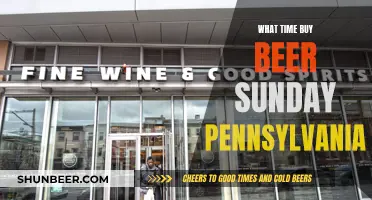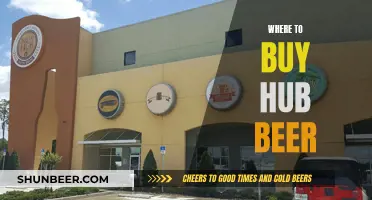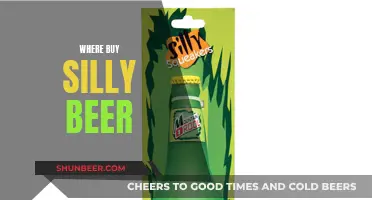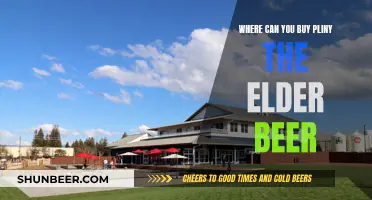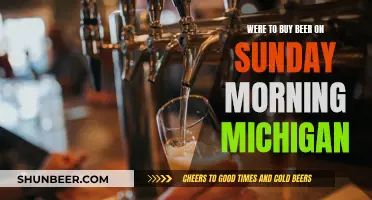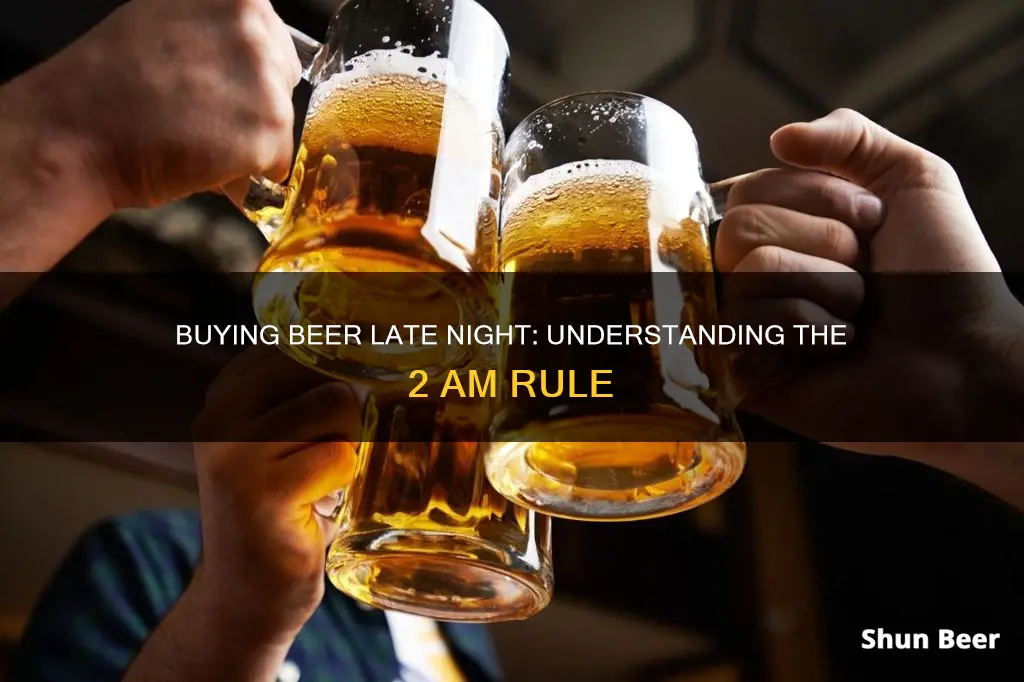
The ability to buy beer after 2 am varies depending on the state and local laws. In the state of Washington, for example, the sale of beer is prohibited between 2 am and 6 am, while other states like Arizona allow beer sales between 6 am and 2 am every day. The United States employs a complex system of federal, state, and local laws to govern how we buy and consume beer, with the 21st Amendment granting states the power to regulate sales. These laws are subject to change, so it's essential to stay informed about the specific regulations in your area to avoid any inconvenience or legal trouble.
| Characteristics | Values |
|---|---|
| Country | United States |
| State | Differs, e.g. Washington, Arizona, California, etc. |
| Day of the Week | Monday-Sunday |
| Time of Day | After 2 am |
| Type of Alcohol | Beer |
| Type of Sale | On-premises, off-premises |
| Purchase Location | Grocery stores, convenience stores, liquor stores, bars |
| Purchase for | Self, others |
| Age | Over 21 |
| Other | Special permits may be obtained for events |
What You'll Learn

Beer sales restrictions in the US
Some states keep it simple with a single set of hours for all types of liquor in all types of sales. However, generally speaking, alcohol selling hours are dictated by the premises or business type, the alcohol type, and the day of the week.
On-premises sales refer to drinks purchased in restaurants and bars, while off-premises sales refer to bottles or cans bought at grocery stores, convenience stores, and liquor stores. Some jurisdictions regulate hours based on the type of business, not just the type of sale.
Some states set hours based on whether you're buying liquor, wine, or beer, with definitions. Some divide it up by ABV (alcohol by volume) so that stronger drinks are more tightly restricted.
Alcohol selling hours often vary by day of the week, and sometimes before or during holidays. For example, in many southern states, you can't buy beer on Sundays, and in other states, you can't buy alcoholic beverages on Christmas Day.
- In Mississippi, you can only buy beer between 10 am and 10 pm from Monday to Saturday. Alcohol sales are prohibited on Sundays and Christmas Day.
- In Washington, the sale of beer is prohibited between 2 am and 6 am.
- In Arizona, you can buy alcohol between 6 am and 2 am every day of the year.
- In California, you can buy alcohol on- or off-premises from 6 am to 2 am any day of the year, but cities and counties can set additional restrictions.
- In Florida, state liquor laws prohibit selling hours (on- and off-premises) between 1 am and 7 am, but counties can override this restriction. For example, in Miami-Dade County, liquor stores are allowed to be open 24/7.
- In Georgia, the only state-wide rule is that Sunday off-premises sales are disallowed from 12:30 pm to 11:30 pm, but local jurisdictions can opt-in to Sunday afternoon sales by referendum.
- In Idaho, state liquor law allows liquor to be sold between 10 am and 1 am, but beer and wine sales can start at 6 am. Counties and cities can extend alcohol service until 2 am, but liquor can't be sold on Sundays or on Memorial Day, Thanksgiving, and Christmas.
Kwik Trip Neenah: Beer Buying Experience
You may want to see also

Local laws governing beer sales
The United States uses a complex system of federal, state, and local laws to govern how we buy and consume beer. While federal alcohol restrictions apply to all states, local laws govern smaller jurisdictions. These laws include the minimum drinking age, alcohol licenses and permits, and beer sales restrictions.
In Mississippi, for example, you can only buy beer between 10 am and 10 pm from Monday to Saturday, with alcohol sales prohibited on Sundays and Christmas Day. In Alabama, alcohol sales are prohibited in several counties known as dry counties. On the other hand, some states like Arizona, California, and Washington allow alcohol sales from 6 am to 2 am every day of the year.
Some states have unique laws regarding alcohol sales. For instance, in Arkansas, on-premise sales are complicated, with different hours for Class A Private Clubs, Class B, and restaurants. In Georgia, there is a state-wide rule prohibiting Sunday off-premise sales from 12:30 pm to 11:30 pm, but public consumption is allowed with certain limitations. In Kentucky, there are many dry counties where alcohol possession is illegal, and only a few counties fully allow sales.
It's important to note that local jurisdictions can often pass their own alcohol laws, and these laws can change at any time. Therefore, it's essential to check your state or local liquor authority website for the most up-to-date information.
When Can You Buy Beer in Georgia?
You may want to see also

Beer sales by state
Beer sales laws vary widely across the United States, with different states and even counties having their own regulations. The 21st Amendment of the U.S. Constitution gives individual states the power to regulate the sale of beer and other alcoholic beverages.
Some states keep it simple with a single set of hours for all types of liquor sales. However, generally speaking, beer selling hours are dictated by the premises or business type, the alcohol type, and the day of the week.
Alabama
Beer and wine are not controlled by the state, but spirits are. Beer and wine can be sold in supermarkets, but spirits cannot. On Sundays, on- and off-premise liquor sales are limited to 2 am. There is a 6% ABV cap on beer sales, and bottles cannot exceed 16 ounces. 26 of Alabama's 67 counties do not allow alcohol sales, though possession and consumption are legal.
Alaska
No alcohol is state-controlled in Alaska. On- and off-premise sales are allowed from 8 am to 5 am. Liquor sales are not permitted in grocery stores.
Arizona
No alcohol is state-controlled in Arizona. Sales are permitted from 6 am to 2 am Monday to Saturday, and 10 am to 2 am on Sunday. Drive-through liquor stores are legal.
Arkansas
On-premise sales are complicated and vary between different types of establishments. Off-premise sales are allowed from 7 am to 1 am Monday to Friday, but only until midnight on Saturdays. Beer and wine can be sold in supermarkets, but only in-state-produced wine is allowed, and spirits are prohibited. Alcohol sales are prohibited on Sundays and Christmas Day.
California
Sales are not controlled by the state. Alcohol sales are allowed from 6 am to 2 am. Wine, beer, and spirits can be sold in grocery stores. Counties can impose additional restrictions.
Colorado
Sales are not controlled by the state. On-premise sales are allowed from 7 am to 2 am, and off-premise sales from 8 am to midnight. Only 3.2% ABV beer can be sold in grocery stores. Liquor stores can only operate one location, and absinthe is legal.
Connecticut
Sales are not controlled by the state. On-premise sales are allowed from 9 am to 1 am Monday to Thursday, and 9 am to 2 am Friday and Saturday. Off-premise sales are allowed from 8 am to 9 pm Monday to Saturday and are prohibited on Sundays and holidays. Beer can be sold in grocery stores.
Delaware
Sales are not controlled by the state. On-premise sales are allowed from 9 am to 1 am, and off-premise sales from 9 am to 1 am Monday to Saturday, and noon to 8 pm on Sunday. Holiday sales are not allowed, nor is off-premise sales outside of a licensed liquor store, taproom, or brewpub.
Florida
Sales are not controlled by the state. On- and off-premise sales are prohibited between 1 am and 7 am, unless the county decides to change the operating hours. For example, in Miami-Dade County, liquor stores may operate 24 hours a day. Beer, wine, and low-alcohol liquors can be purchased at grocery stores. Spirits greater than 76.5% ABV are illegal.
Georgia
Sales are not controlled by the state, and hours of sale are determined by the county. Beer with an ABV above 14% is illegal. No Sunday off-premise sales are allowed. In certain areas, public consumption is legal but limited to one drink on the street, no larger than 16 ounces, and drinking from a can, bottle, or glass is prohibited.
Hawaii
Sales are not controlled by the state. On-premise sales are allowed from 11:50 am to 6 am with the proper cabaret licensing. Off-premise sales are allowed from 11:50 am to 12 am. Spirits, beer, and wine can be sold in grocery stores.
Idaho
Spirit sales are controlled by the state. On-premise sales are allowed from 10 am to 1 am. Beer and wine can be sold in grocery stores, but beverages exceeding 16% ABV can only be sold in state dispensaries or contracted stores.
Illinois
Sales are not state-controlled. On-premise sales are allowed from 6 am to 4 am. All beverages can be sold in grocery stores. Sales laws are determined by local municipalities. Sales on Sundays are not allowed until 11 am.
Indiana
Sales are not controlled by the state. On-premise sales are allowed from 7 am to 3 am Monday to Saturday, and 10:30 am to 12:30 am on Sunday. Off-premise sales are allowed from 7 am to 3 am, but are prohibited on Sundays. Sales are also prohibited on Christmas, New Year's Day, and election day prior to the polls closing. Alcohol can be sold in supermarkets.
Iowa
Spirit sales are controlled by the state. On- and off-premise sales are allowed from 6 am to 2 am Monday to Saturday, and 8 am to 2 am on Sunday. Grocery store alcohol sales are permitted. All beer greater than 6% ABV must be shipped from the state warehouse.
Kansas
While the state does not control liquor distribution, it has some of the strictest laws in the nation. All alcohol was prohibited from 1881 to 1948, and on-premise sales were prohibited from 1881 to 1987. Sunday sales have only been allowed since 2005. In counties that allow on-premise sales, it is permitted from 9 am to 2 am, and off-premise sales from 9 am to 11 pm Monday to Saturday, and noon to 7 or 8 pm on Sundays. 29 counties do not allow on-premise sales, 59 counties only allow it if the establishment makes at least 30% of its profits from alcohol, and only 17 counties allow sales without restriction. Sales are prohibited on Memorial Day, Labor Day, Independence Day, Thanksgiving, Christmas, and Easter. Only 3.2% ABV beer is available at grocery stores.
Kentucky
Sales are not state-controlled. On-premise sales are allowed from 6 am to 4 am, and off-premise sales from 6 am to 2 pm. Alcohol can be sold in grocery stores. However, there are many local exceptions to these laws. 53 counties are completely dry, where even possession is illegal. 16 counties have some cities that allow sales, and 21 counties only allow specialty sales such as wine from wineries. Only 5 counties around the major cities fully allow sales.
Louisiana
Sales are not state-controlled, and there are no restrictions on on- or off-premise sales unless the municipality decides that on-premise sales must stop at 2 pm. Off-premise sales are allowed in grocery stores and all other licensed stores, and can be 24/7. In New Orleans, you can drink alcohol in public and take your drinks from one bar to another. Most bars can be entered at 18, but you must be 21 to purchase and consume alcohol.
Maine
Spirit sales are controlled by the state. On-premise sales are allowed from 6 am to 1 am Monday to Saturday, and 9 am to 1 am on Sunday. Beer and wine can be purchased in grocery stores, but wine with an ABV above 15.5% must be sold in state-contracted stores. Alcohol sales are not permitted after 1 am any day.
Maryland
Sales laws vary by locality and are not state-controlled. Some counties prohibit Sunday sales, while others do not. Some places restrict alcohol heavily, but there are no completely dry counties. Some alcohol is allowed to be sold in grocery stores in some counties.
Massachusetts
Distribution is not state-controlled. On-premise sales are allowed from 8 am to 1 am (2 am in Boston). Off-premise sales are allowed from 8 am to 11 pm, and Sunday sales start at noon. Cities can shorten these times. Some convenience stores are licensed to sell beer, but not grocery stores or gas stations. Happy hours are prohibited, and you can only purchase two drinks per individual at one time on-premise.
Michigan
Spirit sales are controlled by the state. On- and off-premise sales are allowed from 7 am to 2 am, and noon to 2 am on Sundays. Any liquor can be sold at grocery stores and convenience stores, except gas stations in Wayne County. Sales of liquor after 9 pm on December 24 and all of Christmas Day are prohibited. On-premise sales on January 1 are allowed until 4 am.
Minnesota
The state does not control sales. On-premise sales are allowed from 8 am to 2 am. Off-premise sales are allowed from 8 am to 10 pm, and are prohibited on Sundays. Local ordinances can change off-sale hour allowances, and growler sales are allowed until 10 pm.
Mississippi
Spirit distribution is controlled by the state, and sale hours are fixed by local municipalities. Beer can be sold in grocery stores, but wine above 6% ABV can only be sold in state-controlled stores. Sales are prohibited on Christmas Day, but there is no open container law. Coastal casinos provide free alcohol 24/7. In most counties, Sunday sales are prohibited, and there are some dry counties.
Missouri
Missouri has very permissive alcohol laws. Alcohol is not state-controlled. On-premise sales are allowed from 6 am to 1:30 am Monday to Saturday, and 9 am to 12 am on Sunday. St. Louis and Kansas City, and a few other counties can operate from 6 am to 3 am daily. Off-premise sales are allowed during the same hours, and bars can double as liquor stores in St. Louis and Kansas City, which can remain open until 3 am. There are no state open container laws, blue laws, public intoxication laws, and absinthe is not prohibited. There are no dry counties, and prohibiting off-premise sales is illegal. Grocery stores and gas stations can sell liquor, with the only limitation being operating hours. Parents and guardians may give their children alcohol, and there is no prohibition of consumption by minors, though purchase, possession, and intoxication by minors is illegal. Open containers are allowed in Kansas City's Power and Light District. You may manufacture up to 100 gallons of liquor for personal use without state permits or taxes.
Montana
Spirits are regulated by the state, but beer and wine may be sold at grocery stores as long as they are under 16% ABV. Wine above this limit must be sold at state-controlled stores. On-premise sales are limited to 2 am.
Nebraska
Sales are not controlled by the state. On- and off-premise sales are allowed from 6 am to 1 am, though you cannot purchase hard liquor on Sundays before noon. Omaha has repealed the Sunday hard alcohol law. All alcohol can be purchased in grocery stores.
Nevada
The state does not control distribution, and there are very few laws besides those related to age. Stores can be open 24 hours a day, and liquor can be sold in grocery and convenience stores. Public intoxication is legal, and local laws cannot change this.
New Hampshire
Spirit sales are controlled by the state. On-premise sales are allowed from 6 am to 1 am, and off-premise sales until 11:45 pm. Beer can be sold in grocery stores, but there is a 12% ABV cap for beer sold anywhere in the state. Liquor is sold in state-run stores, some of which are located along highway rest areas.
New Jersey
Sales are not controlled by the state, and hours are regulated by each municipality. Beer and wine can occasionally be sold in grocery stores. There are some dry counties, particularly in the southern part of the state.
New Mexico
Sales are not state-controlled. On-premise sales are allowed from 7 am to 2 am, and off-premise sales until midnight, except on Sundays when sales are prohibited. Stores can apply for on- and off-premise licenses to allow for Sunday sales if their municipality allows it, but sales on Christmas are never permitted. Alcohol can be sold in grocery stores. Parents, legal guardians, and adult spouses are allowed to give minors alcohol within private property under their control.
New York
Sales are not controlled by the state. On-premise sales are allowed from 8 am to 4 am. Off-premise beer sales are always available except from 3 to 8 am on Sundays. Wine and spirits can be purchased at liquor stores from 9 am to midnight Monday to Saturday, and noon to 9 pm on Sunday. Many counties restrict hours further, and some restrict overnight sales or Sunday morning sales of beer.
North Carolina
Spirits are controlled by the state. On-premise sales are allowed any time except from 2 am to 7 am Monday to Saturday, and 2 am to noon on Sunday. Beer and wine can be sold in supermarkets, but only state-run stores can sell liquor from 11 am to 9 pm Monday to Saturday. There is a 15% ABV limit on beer.
North Dakota
Sales are not controlled by the state. On-premise sales are allowed from 8 am to 2 am Monday to Saturday, and noon to 2 am on Sunday. Off-premise sales appear to be allowed until 2 am. Sales are limited on Thanksgiving, Christmas, and Christmas Eve.
Ohio
Spirit sales are controlled by the state. On-premise sales are allowed from 5:30 am to 2:30 am, and off-premise sales from 5:30 am to 1 am. Grocery stores can sell all forms of alcohol. The state licenses private businesses for a fee. There is a 12% ABV limit on beer.
Oklahoma
Sales are not controlled by the state. On-premise sales are allowed from 6 am to 2 am, and off-premise sales from 10 am to 9 pm. Only 3.2% beer can be sold in supermarkets, and any beer over 4% can only be sold at room temperature in liquor stores, which are closed on Sundays and some holidays. Stores are open on election days as of 2007.
Oregon
Spirit sales are controlled by the state. On- and off-premise sales are allowed from 7 am to 2:30 am. Beer and wine can be sold at supermarkets, but liquor is only available at state-run liquor stores.
Pennsylvania
Wine and spirits sales are controlled by the state. On-premise sales are allowed from 7 am to 2 am Monday to Saturday, and 11 am to 2 am on Sunday with a special permit, and if non-alcohol sales are at least 30%, private clubs can sell until 3 am. Wine and spirits can only be purchased at state-run liquor stores, which operate from 9 am to 10 pm Monday to Saturday, and noon to 5 pm on Sunday. Liquor permits for events appear to be complex and limited.
Rhode Island
Sales are not controlled by the state. On-premise sales are allowed until 2 am, and off-premise sales from 9 am to 10 pm Monday to Saturday, and noon to 6 pm on Sunday. Alcohol can only be sold in liquor stores.
South Carolina
Sales are not controlled by the state. On-premise sales hours are controlled locally and vary. Beer and low-alcohol wine can be sold 24 hours a day, and liquor can be sold from 9 am to 7 pm Monday to Saturday at liquor stores. There is a 17.5% ABV cap on beer and 16% on wine. No liquor sales are allowed on election day.
South Dakota
Sales are not controlled by the state. Alcohol sales are allowed in supermarkets. There is a 14% ABV limit on beer.
Tennessee
Sales are not controlled by the state. On-premise sales are allowed from 8 am to 3 am Monday to Saturday, and 10 am to 3 am on Sunday. Off-premise sales are allowed from 8 am to 11 pm, except on Sundays. Beer can be sold in supermarkets, and open container laws only apply to the driver of a vehicle, not their passengers.
Texas
Sales are not controlled by the state. On-premise sales are allowed from 7 am to midnight or 2 am. Off-premise beer sales are allowed from 7 am to midnight Monday to Friday, 7 am to 1 am on Saturday, and noon to midnight on Sunday. Hard liquor can be sold from 10 am to 9 pm Monday to Saturday. Beer and wine can be sold in supermarkets. Alcohol above 15.5% ABV requires additional licensing, and on-premise beverages sold on Sunday between 10 am and noon must be accompanied by food.
Utah
Sales are controlled by the state and change frequently. On-premise sales of liquor are allowed by restaurants from noon to midnight, and beer from 10 am to 1 am. Private clubs can serve liquor during the same hours as beer for restaurants. Off-premise sales vary but are all state-run and close no later than 10 pm, and are not open on Sundays. 3.2% ABV beer can be sold in supermarkets. Restaurants and clubs must buy alcohol from state-run stores at retail price, and alcohol cannot be served without food. Only 3.2% ABV beer can be on tap, and keg sales are banned. Alcohol cannot be served on election day until after 8 pm.
Vermont
Spirit sales are controlled by the state. On-premise sales are allowed from 8 am to 2 am, and off-premise sales from 6 am to midnight. Beer under 8% ABV and wine under 16% can be sold in supermarkets. Liquor is only available at state-run stores.
Virginia
Spirits are controlled by the state. On-premise sales are allowed from 6 am to 2
Maryland's Sunday Beer Buying Laws Explained
You may want to see also

Beer sales by day of the week
Beer sales vary depending on the day of the week, with certain holidays and events influencing consumption patterns. In the United States, beer sales tend to peak during the summer months and around major holidays or events.
For instance, the National Beer Wholesalers Association (NBWA) reports that American beer sales reach their highest during the week of the Fourth of July, coinciding with summer cookouts and celebrations. Similarly, Super Bowl Sunday is often associated with increased beer consumption, with some sources ranking it among the top beer-drinking days.
Seasonality plays a significant role in beer sales, with warmer months generally resulting in higher sales. Holidays like Father's Day and Easter, which typically occur during spring or summer, can also contribute to increased sales due to the favourable weather for outdoor gatherings and picnics.
However, beer sales can vary by region and state, with certain states imposing restrictions on the days and hours when beer can be sold. For example, in Mississippi, beer sales are prohibited on Sundays and Christmas Day, while sales hours are limited to 10 am-10 pm on weekdays and Saturdays.
Additionally, cultural norms and local licensing laws can influence beer sales and consumption patterns. For instance, in Ireland, off-licenses stop selling alcohol at 10 pm, and most bars close by 12:30 am, while clubs typically remain open until 2 am.
Understanding these dynamics is crucial for retailers and distributors to effectively manage their beer sales strategies and ensure they comply with local regulations.
Peroni Beer: Where to Buy and What to Know
You may want to see also

Beer sales by type of business
The sale of beer is governed by a complex system of federal, state, and local laws in the United States. While federal alcohol restrictions apply to all states, local laws can vary widely, and it is important to check the specific regulations in your area. That being said, here is an overview of beer sales by the type of business:
On-Premises Sales
On-premises sales refer to the purchase of beer for consumption within the retailer's premises, such as bars and restaurants. The operating hours of these establishments can vary by state and local jurisdiction, and some states allow for extended hours with special permits for certain events. In some states, on-premises sales are prohibited after a certain time, such as 2 am in Washington, while in others, alcohol can be served until the business's regular closing hours, even if it is past the legal timeframe for sales.
Off-Premises Sales
Off-premises sales refer to the purchase of beer bottles or cans from grocery stores, liquor stores, or convenience stores. The hours for off-premises sales can also vary by state and local jurisdiction. For example, in Mississippi, beer can only be purchased off-premises between 10 am and 10 pm from Monday to Saturday, and alcohol sales are prohibited on Sundays and Christmas Day. In other states, such as Arizona, beer can be purchased off-premises between 6 am and 2 am every day of the year.
Business-Type Restrictions
In addition to time restrictions, some states have regulations based on the type of business selling beer. For instance, in Alabama, beer and wine can be sold in supermarkets, but spirits can only be purchased at state-controlled liquor stores. Similarly, in Iowa, liquor is restricted to state-run stores, while beer can be purchased at grocery stores.
ABV Restrictions
Some states also impose restrictions based on the alcohol content of the beverage. For example, California allows the sale of alcohol up to 60% ABV, while anything above this limit is sold in drugstores or pharmacies. In Alabama, there is a 6% ABV cap on beer sales, and bottles cannot exceed 16 ounces.
Dry Counties
It is important to note that some counties within states are completely dry, meaning the sale of alcohol is prohibited. For example, 26 out of Alabama's 67 counties do not allow alcohol sales, although possession and consumption remain legal.
Holiday Restrictions
Beer sales may also be restricted on certain holidays. For instance, in Mississippi, alcohol sales are prohibited on Christmas Day, while in Missouri, liquor law allows on- and off-premises sales every day of the year, including holidays.
In conclusion, the sale of beer in the United States is governed by a variety of federal, state, and local laws, and it is essential to check the specific regulations in your area. The type of business, time of day, day of the week, alcohol content, and local restrictions can all impact the availability of beer purchases.
Buying Beer on Easter Sunday in Georgia: What's Allowed?
You may want to see also
Frequently asked questions
No, the sale of beer in Washington is prohibited between 2 a.m. and 6 a.m.
Yes, some states have different laws. For example, Arizona allows beer purchases from 6 a.m. to 2 a.m. every day.
Yes, in Nevada, alcohol sales are permitted 24 hours a day, except in the township of Penaca, which is dry.
No, generally, there are no legal consequences for individuals who attempt to purchase beer after the prohibited hours. The regulations mainly apply to establishments selling alcohol.
Yes, certain establishments like private clubs may have extended hours for alcohol sales. Additionally, special permits can be obtained for specific events, allowing alcohol sales beyond 2 a.m.


